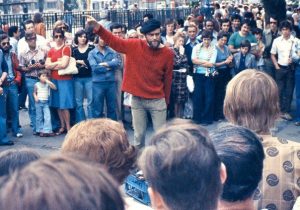 It’s late summer in Anytown, USA: A small platform stands at the edge of a cornfield. A very average-looking person steps up to a microphone and speaks:
It’s late summer in Anytown, USA: A small platform stands at the edge of a cornfield. A very average-looking person steps up to a microphone and speaks:
Friends,
I stand here, not to praise you, but to acquaint you with reality, at least as well as I am able. Perhaps that means I should be run out of town. But if so, so be it; I’m tired of living according to someone else’s script… and perhaps you are too.
Like you, I’m continually inundated with slogans and outrages, each one calculated to make me do one thing or another. All of them have told me how to think and act, but none of them have asked what I wanted to be and do.
And so I think we need to ask ourselves some basic questions: questions that don’t lead to pre-scripted reactions and narrowly-defined choices.
So what, really, do we want? And where should we be headed?
The truth is, as impossible at it may seem, that if we can define what we really want, we can pretty well get it; if we can visualize where we really want to go, we can probably get there.
The great fact of our present situation, as frightening as it may be, is that we’ve transcended scarcity… that poverty and privation are no longer necessary. And by that, I certainly mean that they’re no longer necessary here in America, but I also mean they’re no longer necessary world-wide. For some hard facts to back this up, I recommend Julian Simon’s book The State of Humanity. Just the graphs should be enough to convince you.
We already know how to produce more than enough food for every inhabitant of this planet, and then some. We know how to build enough houses, cars and so on. We know how to provide excellent medical care. Training and raw materials are no real problem either.
The big reason why privation continues is that the systems we’ve been living under were designed for fighting over scarce resources. They continue by frightening populations, collecting their sacrifices, soothing them with promises, and regimenting human action.
This last piece, regimenting human action, is of primary importance: Cooperation is the key to mass prosperity. However much it is restrained, that’s how much privation will remain.
Please understand that all governments, everywhere, share an operating statement that’s an embodiment of restraining human cooperation, and it is this: Do what we say or we’ll hurt you.
Perhaps saying such a thing out loud is rude, and if so I apologize, but it’s true and important all the same.
So, our technology has given us everything we need for a planet-wide golden age. But in order to get it, we’ll have to reorganize ourselves. In specific, we’ll have to drop the ruling systems we’ve been sacrificing our lives to for thousands of years.
And so again I say, we have to decide what we really want. All that talk of peace and love is nice, but are we willing to do what’s required to get it?
What I’d like you to understand is that, if we wanted to, we could step into a golden age. If we bothered to work at it, we’d go down in history as the generation that transformed humanity forever.
Doing that, however, will involve the indignity of changing our minds in fundamental ways.
But for some people, perhaps, creating a golden age isn’t worth such indignity. And if so, I’ve just committed a terrible faux pas by making such a case openly. My apologies where applicable.
To the rest of you I’m saying just this: We need to talk about these things.
Isn’t it odd that the thought of losing scarcity should bother us so badly?
I think scarcity has become a psychological need. I’ll leave the details of this to psychologists and economists, but the systems ruling mankind, since the Bronze Age, have been built directly upon the assumption of scarcity. Should it be a surprise that our personal assumptions would have conformed over so many generations?
Now, rather than continuing on this subject at length, I’ll bring this to a close with a decades-old passage from Eric Hoffer. You can find it in his book, The Ordeal of Change. Here it is:
Now that the new industrial revolution is on the way to solving the problem of means, and we can catch our breath, it behooves us to remember that man’s only legitimate end in life is to finish God’s work – to bring to full growth the capacities and talents implanted within us. A population dedicated to this end will not necessarily overflow with the milk of human kindness, but it will not try to prove its worth by proclaiming the superiority and exclusiveness of its own nation, race or doctrine.
That appeals to me, but perhaps that’s not what most of us want. We do, after all, have options. If we wanted to, we could go full-Caesar on a significant portion of the world, conquering, stealing the things we like and living it up, and probably for a considerable length of time.
You see, these are things we need to discuss. If we don’t, we’ll end up limping along the way we are, slowly declining and eventually seeing other people summon the guts to kick-start a golden age.
I’d like us to build and plant and thrive, and to welcome others to thrive with us. If emotional discomfort is the price we must pay for it, I say we should pay it. You, of course, will make up your own mind. But please, and one last time: These are things we need to talk about.
Thank you for not shooting me.
**
